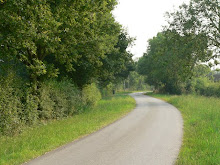Friday, 6 June 2014
D DAY
We live in freedom and democracy in our great country today because of the sacrifices made on the beaches of Normandy seventy years ago today. It is a direct lineage. We have inherited our freedom from those who fought and died for it then.
Visiting the Normandy beaches is a terribly emotional thing. It would be a hard person indeed who remained unmoved by the rows upon rows upon rows upon rows of crosses, marking the fallen. And whereas the Allied graves are marked with glorious monuments, backed by a moral rectitude, no less extensive are the plain grey crosses accorded to the German fallen. And they are no less dead, their families no less bereft.
My favourite story of D Day in my mind epitomizes the very freedom which was being fought for. Shimi Lovat, the Brigadier commanding the 1st Special Service Brigade, was a colourful character who, amongst other trademarks of his individuality, eschewed the khaki uniform sweater replacing it with his own white highland sweater with LOVAT embroidered on it, and replaced the standard Lee Enfield rifle with his own Winchester hunting rifle. He also had his own personal Piper, Bill Millin. Upon disembarking at Sword Beach, he commanded Millin to pipe his men ashore. This had been expressly forbidden in orders given to him, as Millin reminded him. "Ah," said Lovat. "Those are Whitehall orders. We're Scotsman. They don't apply to us. Now, for f*cks sake, play something cheery."
"I suppose you want me to march up and down as well?" asked Millin, amazed.
"That would be very good," said Lovat.
Thus the preposterous occurred. Millin, clad in a kilt, patrolled the beach playing Road to the Isles and Blue Bonnets, oblivious to the incoming fire. Later, German snipers reported a variety of reasons for not shooting him, including that they thought it would be bad luck, and that if he was mad enough to do what he was doing, he ought to be allowed to get on with it.
In both Millin and Lovat were men who epitomised the individualistic, slightly mad art of being British.
I cannot bring to mind such things without my eyes moistening. We owe so much to these men and their comrades. But to honour their bravery and sacrifices properly, I believe takes a personal commitment not to nationalistic patriotism, but instead to a desire to break national boundaries and closed minded entities which ultimately are the reason for conflict and war in the first instance. Our freedom, fought for and won at such a cost, contains as its essence a permission to think beyond what binds "us" to a deeper questioning of "them", and a more universal definition of "us" that includes all humanity.
In this way, at the going down of the sun, and in the morning, will we best remember them.
Subscribe to:
Post Comments (Atom)


















No comments:
Post a Comment